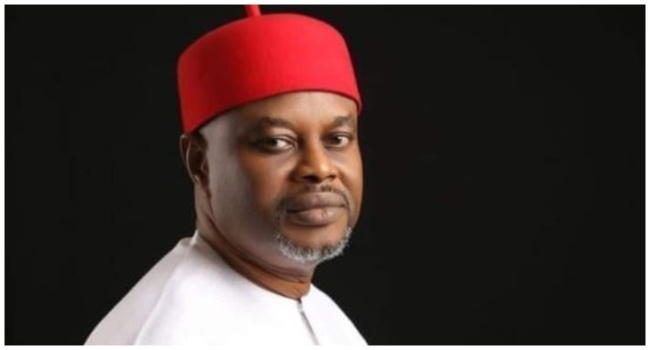
Minister of Innovation, Science and Technology, Uche Nnaji
By Dr. Michael Omoruyi | Founder, iNewsAfrica
In the corridors of governance, innovation and integrity must walk hand in hand. Yet, in Nigeria’s latest courtroom drama, those two ideals collided head-on.
Last week, the Federal High Court in Abuja delivered a defining moment in the country’s transparency journey when it refused to grant an injunction sought by the Minister of Innovation, Science and Technology, Uche Nnaji, to stop the University of Nigeria, Nsukka (UNN) from releasing his academic records.
The ruling—measured yet momentous—has sent ripples through Nigeria’s political and academic landscape, forcing the nation to once again confront an uncomfortable truth: you cannot champion innovation while running from accountability.
The Irony of the Innovator’s Plea
As Minister of Innovation, Uche Nnaji presides over a portfolio designed to propel Nigeria into the digital future—one where transparency, data verification, and academic credibility are essential to building trust in governance and technology.
Yet, his own actions in court painted a paradox. In his filings, Nnaji sought two major reliefs:
A writ of mandamus to compel UNN to produce his academic transcripts, and
An injunction to prevent the same university from releasing or altering those records pending litigation.
Justice Yilwa, who presided over the matter, granted procedural leave for the case to proceed but rejected the injunction, effectively clearing UNN to act transparently. In plain terms, the court told the minister that his academic past cannot be hidden under legal technicalities.
UNN Stands Its Ground
The University of Nigeria, Nsukka, in a formal response dated early October, took a clear stance: it never issued a degree certificate to Uche Nnaji. The university’s letter, signed by the Vice-Chancellor, affirmed that Nnaji did not complete his academic requirements and that there was no official record of his graduation.
This bold institutional clarity stands in stark contrast to years of ambiguity that have shadowed several Nigerian officials accused of credential manipulation.
Even more damning, the National Youth Service Corps (NYSC) has reportedly disowned the discharge certificate attributed to the minister, saying it was never issued by them.
What began as a legal maneuver to control information has now become a national conversation about honesty and qualification in leadership.
A Crisis of Credibility
The court filings further revealed that Nnaji himself admitted that UNN never awarded him a degree certificate—an admission that, while legally strategic, has deepened the public’s distrust.
As someone entrusted with the nation’s innovation agenda, his attempt to suppress transparency undermines both the ethics of public service and the credibility of Nigeria’s digital transformation vision.
In a country striving to digitize its systems and restore confidence in its educational institutions, the notion that a minister could seek to block a university from releasing legitimate records cuts deep into the public psyche.
Integrity, like innovation, is not optional—it’s foundational.
The Court’s Message: Transparency Is Non-Negotiable
By rejecting the injunction, the Federal High Court reinforced a principle long overdue in Nigerian governance: public records belong to public scrutiny when public trust is at stake.
Justice Yilwa’s ruling aligns with a modern interpretation of democracy—one where data transparency, accountability, and ethical leadership are inseparable. The message is clear: you cannot digitize deceit.
Lessons for Nigeria’s Political Class
The Uche Nnaji case is more than a scandal—it’s a systemic mirror.
It exposes the fragile relationship between truth and power, and the dangers of placing political expediency above moral clarity.
Every appointee, from minister to local council chair, must recognize that credentials are not ornaments of office—they are covenants of credibility.
In a digital era where information moves faster than manipulation, attempts to conceal the past only magnify public doubt.
The Way Forward: From Secrecy to Systemic Reform
This controversy should ignite reforms in how Nigeria verifies the credentials of public officials. Universities must digitize academic records, the NYSC should maintain a verifiable blockchain-style database for certificates, and all political appointments must pass through independent credential verification portals before confirmation.
Innovation cannot thrive where truth is negotiable. The future of governance depends not only on technology but on the moral software that powers it—integrity.
A Final Reflection
When innovation meets integrity, nations rise.
When innovation divorces integrity, nations stumble.
The court’s decision in Abuja reminds us that leadership is not about hiding transcripts—it’s about writing new chapters of trust.
If Nigeria is truly to lead in science, technology, and innovation, it must start by innovating its ethics. Because the real test of progress is not in code or policy—it’s in character.
About the Author
Dr. Michael Omoruyi is the Founder of iNewsAfrica and author of From Grit to Grace: A Memoir of Roots, Resilience, and Reinvention. He writes on ethics, innovation, and Africa’s socio-digital transformation.

Dr. Omoruyi’s memoir launches across Amazon and other bookstores Worldwide – October 21, 2025
Follow iNewsAfrica channel on WhatsApp:
https://whatsapp.com/channel/0029VbAPrqI96H4JXXQrKP1V











